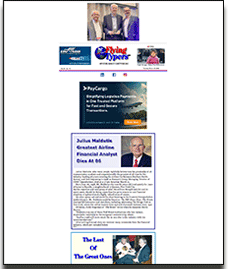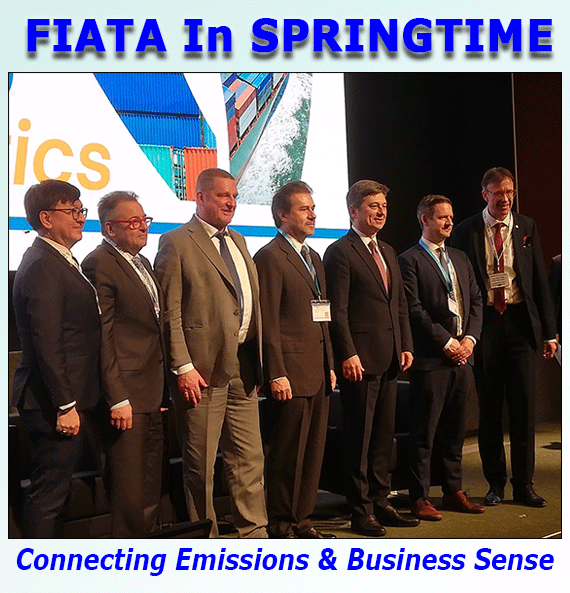
At FIATA Headquarters Sessions in Geneva pictured from left: Dr. Thomas Sim, Group Chief Executive Officer of International Freight Consultants (S) Pte. Ltd.; Marc Bibeau, PRESIDENT AND CEO, OEC GROUP; Jens Roemer, Managing Director, A Hartrodt; Luis Alberto Castiglioni, former Vice President of Paraguay, Turgut Erkeskin, President & CEO, Genel Transport & FIATA President;Tobias Wölfel, Senior Expert - Travel, Transport & Logistics, McKinsey & Company and Dr. Stéphane Graber, Director General FIATA.
The event brought together the world’s leading logistics professionals, freight forwarders, and supply chain experts for insightful discussions, networking opportunities, and strategic collaborations including a keynote from Luis Alberto Castiglioni. |
After a long journey, as both Italian and Swiss railways decided that this Sunday was the best day for network and equipment maintenance, I arrived in Geneva after dusk.
On Monday 17th of March at 9 o’ clock, as sharp as a Swiss clock, the FIATA Headquarters’ meeting began with a rather ambitious programme, harbouring the desire to “provide participants with key market trends and trade developments as well as an external outlook in corridors and logistics in an uncertain environment.” Michael McKay kicked the ball with some historical and cultural background for the city of Geneva, a crossroad for the world of trade and an international meeting magnet: 5,000 conferences annually, half a million delegates, 43 high level international organizations based in Geneva . . . shall we name them all? One for all: the Red Cross/Red Crescent.
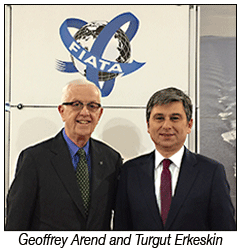 President Turgut Erkeskin welcomed 200+ delegates at FIATA’s HQ from 51 countries: “this year, speakers and moderators have been invited from all over the world” to animate several sessions. Among the achievements of FIATA, Turgut mentioned the excellent work with many international organizations, the achievements in FIATA’s digital policy and risk and insurance and cybersecurity policies. He also gave account of a new regional engagement programme, which – for the first time this year – will see FIATA organizing regional meetings in all regions, starting with Zanzibar, then India, Brazil and Prague in the EU. “FIATA remains focused on trade facilitation,” declared Turgut. Maybe it was not meant in that manner, but in a world which is rapidly changing, his statement sounded as an appeal to preserve the beauty of international cooperation. I am now writing in the middle of the second day of meetings and I can assure you that FIATA tried to preserve such beauty with all hands on deck! President Turgut Erkeskin welcomed 200+ delegates at FIATA’s HQ from 51 countries: “this year, speakers and moderators have been invited from all over the world” to animate several sessions. Among the achievements of FIATA, Turgut mentioned the excellent work with many international organizations, the achievements in FIATA’s digital policy and risk and insurance and cybersecurity policies. He also gave account of a new regional engagement programme, which – for the first time this year – will see FIATA organizing regional meetings in all regions, starting with Zanzibar, then India, Brazil and Prague in the EU. “FIATA remains focused on trade facilitation,” declared Turgut. Maybe it was not meant in that manner, but in a world which is rapidly changing, his statement sounded as an appeal to preserve the beauty of international cooperation. I am now writing in the middle of the second day of meetings and I can assure you that FIATA tried to preserve such beauty with all hands on deck!
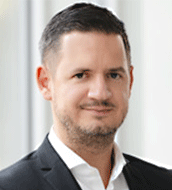 Tobias Wölfel from McKinsey, during his expert key note address, referred supply and demand on international and ocean markets, trends in freight forwarding and implications for freight forwarders in future observing, for example, that ecommerce represents 20% of airfreight market. On U.S. de minimis, about which we have discussed in other articles, the risk at stake is a not negligible 50% loss. It was noted that 85% of air imports in the USA fall within de minimis. Looking at the equipment, in the long run demand for freighters and belly hold is supposed to raise, in particular thinking that 30% of freighters are already 30 years old or older. It was implied that disruptions will impact the supply side and the demand side may be consequently affected, but I personally think that this could happen only if the demand increases or remains stable, which is not a given in this period of swift decisions affecting international trade. Wölfel continued his presentation noting that freight forwarding remains a profitable market, with a high ROIC, but volatility is here to stay. M&A and consolidations will continue, changing growth dynamics among clients. Technology and digitization still offer margins to grow within the industry. It was noted that we are all “interconnected” – hence the motto of the event – and in modern trade all regions depend on one another, even China and the U.S., which are the largest markets. We were given a matrix that can give you an idea of the level of interconnection for all markets in which forwarders operate and which we are trying to show here: Tobias Wölfel from McKinsey, during his expert key note address, referred supply and demand on international and ocean markets, trends in freight forwarding and implications for freight forwarders in future observing, for example, that ecommerce represents 20% of airfreight market. On U.S. de minimis, about which we have discussed in other articles, the risk at stake is a not negligible 50% loss. It was noted that 85% of air imports in the USA fall within de minimis. Looking at the equipment, in the long run demand for freighters and belly hold is supposed to raise, in particular thinking that 30% of freighters are already 30 years old or older. It was implied that disruptions will impact the supply side and the demand side may be consequently affected, but I personally think that this could happen only if the demand increases or remains stable, which is not a given in this period of swift decisions affecting international trade. Wölfel continued his presentation noting that freight forwarding remains a profitable market, with a high ROIC, but volatility is here to stay. M&A and consolidations will continue, changing growth dynamics among clients. Technology and digitization still offer margins to grow within the industry. It was noted that we are all “interconnected” – hence the motto of the event – and in modern trade all regions depend on one another, even China and the U.S., which are the largest markets. We were given a matrix that can give you an idea of the level of interconnection for all markets in which forwarders operate and which we are trying to show here:
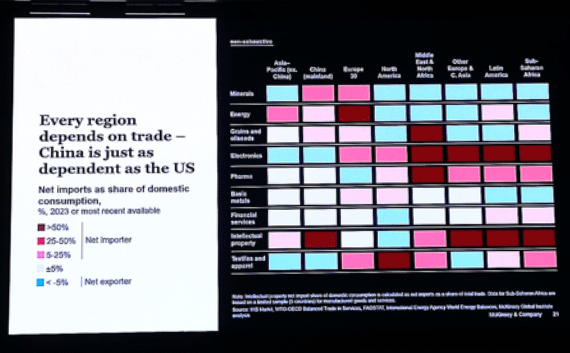 |
Reviewing forwarders’ value proposition and focussing on the products that are less likely to be appropriated by liners, that’s the recipe to stay in business!
In the Q&A a delegate pondered on the liners’ tendency to invade forwarders’ commercial space . . . Reflecting on the situation in Africa: “bigger size vessels pose problems not only to Africa, but also to other areas of the world”. In reply to a remark on the issues posed by the Trump presidency, Tobias Wölfel said that a lot of volatility is expected, with greater fragmentation and dispersion of supply chain, but no real collapse: “Nobody can handle business without international trade.” In the following debate an almost alarming concept materialized: “there is a risk that tech players like Google or Amazon come up with something new that we do not anticipate.” But it was contended in the debate that current gen-AI is still not able to do the forwarders’ job. My perception is actually different, but who am I to talk? Fingers crossed.
The traditional Multimodal Transport Institute, which was next in the agenda, was the first of the FIATA bodies to be transformed into a multiple level discussion, with three breakout sessions. I find this modern approach partly satisfactory, not for this session in particular, as all subsequent sessions were similarly organized. On the one hand this is an excellent instrument to get everybody on board in the discussion, but at the end of the day the results are reduced to a summary of evidences at a common level. This is a new approach for the FIATA HQ, and probably it needs some further adjustment, but I have no doubt that these steps have been taken to enhance members’ interest and engagement, a result that was surely achieved. ‘Addressing Major Issues in Multimodal Transport Logistics’, i.e. the title selected, assured everybody that the “session [would] provide a platform to identify and address key issues affecting multimodal logistics, with a focus on maritime industry and sustainability, exploring the GHG Accounting and data management, issues affecting road industry, and role of rail transport within multimodal international transport.” Emissions accounting took the front row then. This is such an important issue for the future of the industry that we need to give account of the discussion in some detail. Question: why regulators are putting the burden on FF’s, considering they are not directly moving cargo? It was noted that the burden stays with everybody, but “forwarders are the first point of contact and therefore they are involved. You are not directly responsible, but this is how you come into the picture.”
I would personally contend that it is all very well for regulators to look at forwarders as an informed party holding precious information, but the regulator should also understand that information does not come as a gift: it is a hard-earned element of our business and the least that could be done in return would be providing additional facilitation for those who do the job. Apropos there was a general agreement on the fact that reporting emission is a regulatory driven requirement, not a customers’ required service . . . at most, marginally. There were questions on the credibility of statistical data. In his reply the moderator said: “In terms of what shippers are doing, it is a big black box”, in other words my understanding is that we are at the beginning of the journey and it will not be a smooth one.
Open issues emerged as though it was raining: reorganization of the road haulage sector with/through UNECE’s guidance, swapping trailers to gain efficiency, electrification of HDV’s, cross border procedures, quality in rail services and funding thereof, issues with infrastructure, as well as documents and Customs. Collaboration and infrastructure topped the bill in multimodal transport operators’ desirables. Looking at the sky, despite winds of change from the USA, the moderators were sceptical that much would change in aviation, in particular CORSIA will continue. “There will be more and more compliance, less voluntary efforts and more market” was one of the last remarks.
We were then huddled to the Press Conference, where we found super food and beverages in tune. The Press Conference was interesting and lively, even overshooting its allotted time. We remind the reader that parts of the conference are available on line on LinkedIn, as published by FlyingTypers’ Geoffrey Arend.
Let us now jump to “Building Cyber Resilience with the World Economic Forum”. In this day and age this session, hosted by the Advisory Body Safety and Security, debated one of the most important areas in forwarders’ risk assessment. Thus was introduced by FIATA: “in today’s hyper-connected world, cybersecurity has become a cornerstone of resilience and trust in digital systems. As cyber threats continue to evolve in sophistication and scale, organisations across industries face unprecedented challenges. With ransomware, data breaches, and supply chain vulnerabilities making headlines, businesses must shift from reactive to proactive cybersecurity strategies.”
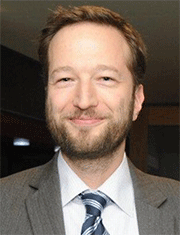 We were informed by ABSS’s chair Niels Beuck that FIATA published a cybersecurity guide book for navigating the dangers posed by cyber-attacks, and analyzing what happens in your business if you have been attacked. “There could be catastrophic outcomes for companies, but there are strategies to mitigate the danger,” was noted by Niels. We were informed by ABSS’s chair Niels Beuck that FIATA published a cybersecurity guide book for navigating the dangers posed by cyber-attacks, and analyzing what happens in your business if you have been attacked. “There could be catastrophic outcomes for companies, but there are strategies to mitigate the danger,” was noted by Niels.
In reporting from the separate sessions, the moderators gave some takeaways: there is significant talent shortage affecting the industry, and a certain degree of lack of awareness. Employees must appropriately understand the level of risk; in small organizations outsourcing and security is delegated to only one person, this can increase the risk; cyber-hygiene must be recognized as everyone’s responsibility. Creating a platform to support smaller organizations to ensure an adequate level of security could be an answer, maybe a new mission for FIATA? People in trust, the role of communication with customers and other stakeholders on a regular basis, oversight on communication channels running are the absolute essentials. Re. shame culture: it must change! This is key to change the mind-set. Perpetrators should suffer, not the victims. Awareness and education campaigns are vital, e.g. in Germany there is a collaboration platform, which is really successful.
My dear readers, let me leave you now with two promises: the next article will deal with air cargo and the Air Freight Institute plus, maybe a ruddier promise, that we shall take you to Vietnam in the autumn? A toute à l’heure, as they say in Geneva and in France; if I had said à tantôt, you would know that Brussels was the place. It was a long day, please bear with me . . .
Marco Sorgetti
|




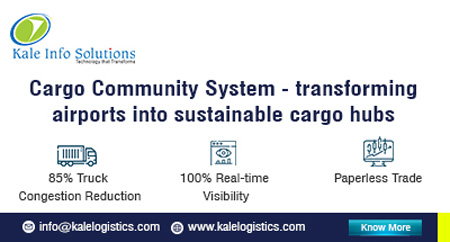

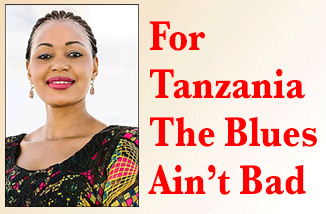 Right now in 2025 is an exciting moment for the Government of Tanzania through the President of the United Republic of Tanzania, Dr. Samia Sulu Hassan.
Right now in 2025 is an exciting moment for the Government of Tanzania through the President of the United Republic of Tanzania, Dr. Samia Sulu Hassan.
 Vol.
24 No. 13
Vol.
24 No. 13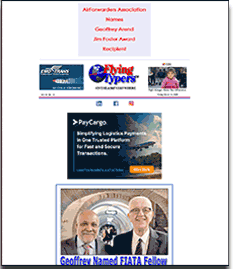 Vol. 24 No. 14
Vol. 24 No. 14